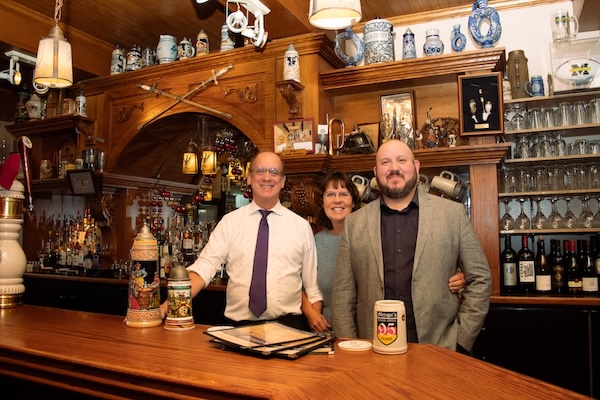
AADL Talks To: Earl Jackson
 In this episode, AADL Talks To Earl Jackson. Earl talks about his time growing up in Ypsilanti and Ann Arbor, from his early years to his work at Borders Books and Music where he worked as a framer to the evolution of his career in the visual arts. He also discusses some of the organizations and people who inspired and mentored him, and reflects on the changes in themes and style in his work.
In this episode, AADL Talks To Earl Jackson. Earl talks about his time growing up in Ypsilanti and Ann Arbor, from his early years to his work at Borders Books and Music where he worked as a framer to the evolution of his career in the visual arts. He also discusses some of the organizations and people who inspired and mentored him, and reflects on the changes in themes and style in his work.

AADL Talks To: Peter Yates

Peter is a professional photographer who started as a street photographer in New York and went on to work for national magazines and newspapers shortly after moving to Ann Arbor in 1969.
Peter reminisces about some of his memorable photography assignments; the restaurants and music venues he misses; the friends and colleagues who helped him; and his time working in Ann Arbor -- at Mark's Coffeehouse, the Blind Pig, and the Ann Arbor Observer.

AADL Talks To: Grace Shackman

Grace Shackman is an author, educator, and former Washtenaw County Commissioner. But she's probably best known as a local historian and a long-time contributor to the Ann Arbor Observer, where she has dug into many fascinating topics of local and regional history. Grace tells us about how she became involved in politics, her research process, and how her interests spurred her beyond her shy nature.
Find more by and about Grace Shackman in our archival collections.
The Gayest Generation Ep. 14 - Laughing Womyn Ashonosheni
Welcome to The Gayest Generation, where we hear LGBTQ older adults speak for themselves. Every episode, we sit down with a different member of the LGBTQ community who laid the foundation for the freedoms we have today. Their stories make noise where there is silence and that silence has lived for far too long.
In this episode, we speak with Laughing Womyn Ashonosheni. We discuss queer spirituality, how to mend broken relationships, and the act of naming oneself.
AADL is excited to announce that you can listen to this episode, or any episode of The Gayest Generation, on Apple Podcasts, Spotify, or YouTube!

AADL Talks To: Sharon McRill

In this episode, AADL Talks To Sharon McRill. Back in the 1990s, Sharon spent several years with Borders. There she served as a new media liaison when DVDs and games on CD were new technologies, interviewed celebrities, and helped build the first Border’s website. After the first round of Border’s layoffs left her wondering what to do next, she decided to start her own business helping people clean and organize, move, and more. Sharon talks about the evolution of the Betty Brigade from its early years to the thriving business it is today.
For more information about Borders, see our digital collections.

AADL Talks To: John Metzger

In this episode, AADL Talks To John Metzger, third-generation owner of Metzger's Restaurant at 305 N Zeeb Rd. John walks us through the history of his family's restaurant, from its origin 90 years ago on Washington Street in Ann Arbor, and discusses what's changed - and what's remained the same - over the years as the business passed from his grandfather to his father to John. He also shares his memories of growing up in the restaurant; his efforts, along with his sister Heidi, to reopen at a new location on the west side of town after closing the downtown location; and he talks about the employees and customers that have kept the business a thriving enterprise for nearly a century.
Read historical articles about Metzger's.
Browse our Metzger Family Collection featuring many of the historical photos that line the walls of Metzger's Restaurant.

AADL Talks To: Margaret Parker

In this episode, AADL Talks to Margaret Parker. Margaret has been working as an artist for seven decades. She talks about her parents’ influence on her desire to become an artist and the evolution of her artistic development, from working in different mediums to confronting social justice issues in her work. Margaret talks about her time with the Michigan chapter of the Women's Caucus for Art and her commitment to bring public to Ann Arbor through her work on the Ann Arbor Public Art Commission.
For more information, see our digital collections related to Margaret Parker, or visit the artist's website.

AADL Talks To: Paul Kahlenberg & Zac Johnson

In this episode, Paul Kahlenberg and Zac Johnson talk about managing Tower Records in Ann Arbor. They reminisce about the store's tight-knit staff, visits from bands both globally and locally famous, and selling concert tickets before the internet.
Find more about Tower Records in our archival collections.

AADL Talks To: Janis Bobrin

Janis Bobrin came to the University of Michigan in 1969 to study urban planning and quickly became politically active in environmental issues with a particular interest in water resource management. She eventually served six terms as Washtenaw County Drain Commissioner. Since retiring as Drain Commissioner in 2012, Janis has served on numerous regional boards including the Huron River Watershed Council, the Michigan League of Conservation Voters, and Dawn Farm. Janis talks with us about some of the projects she undertook as Drain Commissioner and the many challenges she and her staff faced over the years. She also talks with us about Ann Arbor's ongoing efforts to address the Pall-Gelman dioxane spill and issues surrounding urban planning and density.
Read more about Janis Bobrin in historical articles from the Ann Arbor News and Ann Arbor Observer.

AADL Talks To: Peter Andrews

In this wide-ranging interview from 2010, Peter Andrews recalls his varied career producing and managing local and regional music talent — from managing the Scot Richard Case (SRC) band and bringing bands like The Who, Jimi Hendrix, and the Yardbirds to Ann Arbor’s Fifth Dimension club, to booking national acts for University of Michigan student groups. He also discusses his role in Ann Arbor’s legendary Blues and Jazz Festivals, producing the John Sinclair Freedom Rally at Crisler Arena in 1971, and bringing John Lennon and Yoko Ono to town.